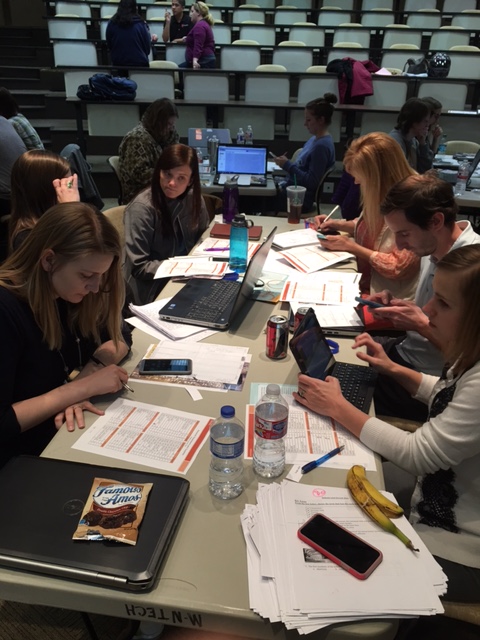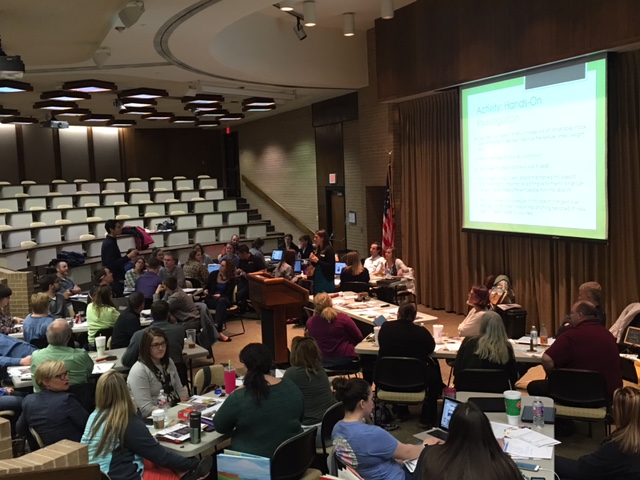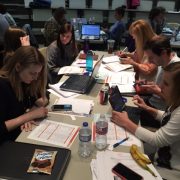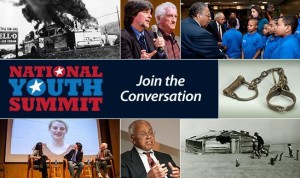Special thanks to Paula Lee, Smithsonian Affiliations intern, for this guest post. This is the first of a five-part blog series she is writing as part of the Young Historians, Living Histories (YHLH) collaboration with the Asian Pacific American Center and our Affiliate network.

Asian Pacific American youth representing the Young Historians, Living History after completing a workshop
Early this August, I had an extraordinary opportunity to join Smithsonian Affiliations as an intern directly assisting with the Young Historians, Living Histories grant. After a few weeks of researching the project, I spoke with Leah Craig, Curator of Education at the Oklahoma History Center, an Affiliate in Oklahoma City. Oklahoma History Center is one of nine Affiliate museums selected to receive the YHLH grant funded by the Smithsonian’s Youth Access Grant program. Additional Affiliates include Wing Luke Museum of the Asian Pacific American Experience (Seattle, WA), Institute of Texan Cultures (San Antonio, TX), Western Reserve Historical Society (Cleveland, OH), Pacific Aviation Museum (Honolulu, HI), Sonoma County Museum (Santa Rosa, CA), Greensboro Historical Museum (Greensboro, NC), Riverside Metropolitan Museum (Riverside, CA), and Historic Arkansas Museum (Little Rock, AR).
This program is an educational initiative designed to engage underserved youth in Asian Pacific American communities by incorporating the use of digital media to produce oral histories. Being an Asian American myself, I was particularly thrilled at the chance to be involved in a project that hit so close to home. The Affiliates have collaborated with the Smithsonian Asian Pacific American Center (APAC) and the Center for Asian American Media (CAAM) to provide essential curriculum guidelines that will be used to train educators to implement youth workshops. Participating Affiliates have recruited Asian Pacific American students to attend workshops at the museums. Middle and high school students will learn a variety of 21st-century skills, methods of community outreach, and digital storytelling to explore, contextualize, and deepen their understanding of Asian Pacific American history and culture.

Curator Leah Craig leading one of many workshops on Asian American history
While the Affiliates were busy recruiting students, Craig had already begun to lead a team of 20 gifted and talented students from Norman High School through active learning workshops. The workshops covered essential editing, filming, interviewing and a lesson in Asian Pacific American history with the help of teachers Margaret Wadleigh, LaRadius Allen, and Moving Image Archivist Corey Ayers. Students that participated in the workshop came from diverse cultural backgrounds and were placed in groups that encouraged them to share their stories and ideas as they began their transformation into historians seeking stories within the Asian Pacific American community. At only 1.9 percent, Oklahoma’s Asian American population isn’t large but according to the U.S. Census Bureau it includes a variety of Chinese, Korean, Pilipino, Burmese, and Hmong communities with significant Vietnamese and growing Indian communities. The program has enticed the young historians to become curious and research the immigration stories that attracted Asian Americans’ very first settlement into Oklahoma such as the Land Run in 1889.

Shoulder to Shoulder– Oklahoman students eager to learn the film making processes of oral histries in a workshop led by Moving Image Archivist, Corey Ayers
Craig boasts that “by conducting the oral histories students are helping us collect the history of our community from people with whom we may not have any other way to collect their stories.” Students were challenged to reveal the hidden struggles and accomplishments that Asian Pacific Americans in their own families/personal network had endured while en route, discovering a part of them that was never truly appreciated. Wadleigh, one of the two mentoring teachers, observed that the oral history element of this project engaged the students in a way that activated their “emotional” skills, skills that helped them discover powerful stories that couldn’t be told through any textbook. Look forward to future posts under the YHLH Series as we begin to unravel the unique stories hidden across the nation “oh the places we’ll go” when we’re looking!
 On February 11 educators from the Oklahoma History Center (OHC) were invited by the Smithsonian’s National Museum of American History to participate in its Let’s Do History Tour in Norman, Oklahoma. OHC Education Department staff provided a one-hour presentation about various programs offered by the Oklahoma History Center. The presentation included a detailed discussion of our traveling trunk program, with an opportunity for several unique learning experiences. Teachers explored and interacted with four different trunks. They also participated in two hands-on activities facilitated by our staff.
On February 11 educators from the Oklahoma History Center (OHC) were invited by the Smithsonian’s National Museum of American History to participate in its Let’s Do History Tour in Norman, Oklahoma. OHC Education Department staff provided a one-hour presentation about various programs offered by the Oklahoma History Center. The presentation included a detailed discussion of our traveling trunk program, with an opportunity for several unique learning experiences. Teachers explored and interacted with four different trunks. They also participated in two hands-on activities facilitated by our staff.












